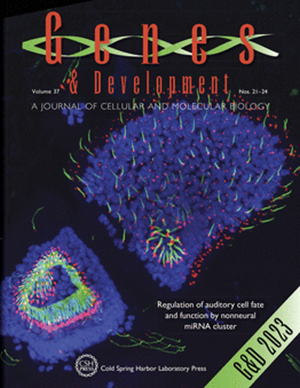Chronic interferon-stimulated gene transcription promotes oncogene-induced breast cancer
IF 7.5
1区 生物学
Q1 CELL BIOLOGY
引用次数: 0
Abstract
The MRE11 complex (comprising MRE11, RAD50, and NBS1) is integral to the maintenance of genome stability. We previously showed that a hypomorphic Mre11 mutant mouse strain (Mre11ATLD1/ATLD1) was highly susceptible to oncogene-induced breast cancer. Here we used a mammary organoid system to examine which MRE11-dependent responses are tumor-suppressive. We found that Mre11ATLD1/ATLD1 organoids exhibited an elevated interferon-stimulated gene (ISG) signature and sustained changes in chromatin accessibility. This Mre11ATLD1/ATLD1 phenotype depended on DNA binding of a nuclear innate immune sensor, IFI205. Ablation of Ifi205 in Mre11ATLD1/ATLD1 organoids restored baseline and oncogene-induced chromatin accessibility patterns to those observed in WT. Implantation of Mre11ATLD1/ATLD1 organoids and activation of the oncogene led to aggressive metastatic breast cancer. This outcome was reversed in implanted Ifi205−/− Mre11ATLD1/ATLD1 organoids. These data reveal a connection between innate immune signaling and tumor development in the mammary epithelium. Given the abundance of aberrant DNA structures that arise in the context of genome instability syndromes, the data further suggest that cancer predisposition in those contexts may be partially attributable to chronic innate immune transcriptional programs.慢性干扰素刺激基因转录促进癌基因诱发乳腺癌
MRE11 复合物(由 MRE11、RAD50 和 NBS1 组成)是维持基因组稳定性不可或缺的部分。我们以前曾发现,低常的Mre11突变小鼠品系(Mre11ATLD1/ATLD1)极易患癌基因诱导的乳腺癌。在这里,我们利用乳腺类器官系统研究了哪些依赖于 MRE11 的反应具有抑制肿瘤的作用。我们发现 Mre11ATLD1/ATLD1 有机体表现出干扰素刺激基因(ISG)特征的升高和染色质可及性的持续变化。这种Mre11ATLD1/ATLD1表型依赖于核先天免疫传感器IFI205的DNA结合。在Mre11ATLD1/ATLD1器官组织中消融Ifi205可将基线和癌基因诱导的染色质可及性模式恢复到WT中观察到的模式。植入Mre11ATLD1/ATLD1器官组织并激活癌基因会导致侵袭性转移性乳腺癌。植入Ifi205-/-Mre11ATLD1/ATLD1器官组织后,这一结果发生逆转。这些数据揭示了先天性免疫信号传导与乳腺上皮肿瘤发生之间的联系。鉴于基因组不稳定综合征中出现了大量异常DNA结构,这些数据进一步表明,这些情况下的癌症易感性可能部分归因于慢性先天性免疫转录程序。
本文章由计算机程序翻译,如有差异,请以英文原文为准。
求助全文
约1分钟内获得全文
求助全文
来源期刊

Genes & development
生物-发育生物学
CiteScore
17.50
自引率
1.90%
发文量
71
审稿时长
3-6 weeks
期刊介绍:
Genes & Development is a research journal published in association with The Genetics Society. It publishes high-quality research papers in the areas of molecular biology, molecular genetics, and related fields. The journal features various research formats including Research papers, short Research Communications, and Resource/Methodology papers.
Genes & Development has gained recognition and is considered as one of the Top Five Research Journals in the field of Molecular Biology and Genetics. It has an impressive Impact Factor of 12.89. The journal is ranked #2 among Developmental Biology research journals, #5 in Genetics and Heredity, and is among the Top 20 in Cell Biology (according to ISI Journal Citation Reports®, 2021).
 求助内容:
求助内容: 应助结果提醒方式:
应助结果提醒方式:


